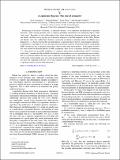| dc.contributor.author | Aaronson, Scott | |
| dc.contributor.author | Chua, Lynn | |
| dc.contributor.author | Lowther, George | |
| dc.contributor.author | Bouland, Adam Michael | |
| dc.date.accessioned | 2014-01-17T19:55:51Z | |
| dc.date.available | 2014-01-17T19:55:51Z | |
| dc.date.issued | 2013-09 | |
| dc.date.submitted | 2013-07 | |
| dc.identifier.issn | 1050-2947 | |
| dc.identifier.issn | 1094-1622 | |
| dc.identifier.uri | http://hdl.handle.net/1721.1/84072 | |
| dc.description.abstract | Formalizing an old desire of Einstein, “ψ-epistemic theories” try to reproduce the predictions of quantum mechanics, while viewing quantum states as ordinary probability distributions over underlying objects called “ontic states.” Regardless of one's philosophical views about such theories, the question arises of whether one can cleanly rule them out by proving no-go theorems analogous to the Bell inequality. In the 1960s, Kochen and Specker (who first studied these theories) constructed an elegant ψ-epistemic theory for Hilbert space dimension d = 2, but also showed that any deterministic ψ-epistemic theory must be “measurement contextual” in dimensions 3 and higher. Last year, the topic attracted renewed attention, when Pusey, Barrett, and Rudolph (PBR) showed that any ψ-epistemic theory must “behave badly under tensor product.” In this paper, we prove that even without the Kochen-Specker or PBR assumptions, there are no ψ-epistemic theories in dimensions d ≥ 3 that satisfy two reasonable conditions: (1) symmetry under unitary transformations and (2) “maximum nontriviality” (meaning that the probability distributions corresponding to any two nonorthogonal states overlap). This no-go theorem holds if the ontic space is either the set of quantum states or the set of unitaries. The proof of this result, in the general case, uses some measure theory and differential geometry. On the other hand, we also show the surprising result that without the symmetry restriction, one can construct maximally nontrivial ψ-epistemic theories in every finite dimension d. | en_US |
| dc.description.sponsorship | National Science Foundation (U.S.) (Grant 0844626) | en_US |
| dc.description.sponsorship | National Science Foundation (U.S.) (STC Grant) | en_US |
| dc.description.sponsorship | Alfred P. Sloan Foundation (Fellowship) | en_US |
| dc.description.sponsorship | Alan T. Waterman Award | en_US |
| dc.description.sponsorship | National Science Foundation (U.S.). Graduate Research Fellowship Program (Grant 1122374) | en_US |
| dc.description.sponsorship | National Science Foundation (U.S.) (Center for Science of Information Grant Agreement CCF-0939370) | en_US |
| dc.description.sponsorship | MIT Summer Research Program | en_US |
| dc.language.iso | en_US | |
| dc.publisher | American Physical Society | en_US |
| dc.relation.isversionof | http://dx.doi.org/10.1103/PhysRevA.88.032111 | en_US |
| dc.rights | Article is made available in accordance with the publisher's policy and may be subject to US copyright law. Please refer to the publisher's site for terms of use. | en_US |
| dc.source | American Physical Society | en_US |
| dc.title | ψ-epistemic theories: The role of symmetry | en_US |
| dc.type | Article | en_US |
| dc.identifier.citation | Aaronson, Scott, Adam Bouland, Lynn Chua, and George Lowther. “ψ-epistemic theories: The role of symmetry.” Physical Review A 88, no. 3 (September 2013). © 2013 American Physical Society | en_US |
| dc.contributor.department | Massachusetts Institute of Technology. Department of Electrical Engineering and Computer Science | en_US |
| dc.contributor.department | Massachusetts Institute of Technology. Department of Mathematics | en_US |
| dc.contributor.mitauthor | Aaronson, Scott | en_US |
| dc.contributor.mitauthor | Bouland, Adam Michael | en_US |
| dc.contributor.mitauthor | Chua, Lynn | en_US |
| dc.relation.journal | Physical Review A | en_US |
| dc.eprint.version | Final published version | en_US |
| dc.type.uri | http://purl.org/eprint/type/JournalArticle | en_US |
| eprint.status | http://purl.org/eprint/status/PeerReviewed | en_US |
| dspace.orderedauthors | Aaronson, Scott; Bouland, Adam; Chua, Lynn; Lowther, George | en_US |
| dc.identifier.orcid | https://orcid.org/0000-0002-8556-8337 | |
| dc.identifier.orcid | https://orcid.org/0000-0003-1333-4045 | |
| mit.license | PUBLISHER_POLICY | en_US |
| mit.metadata.status | Complete | |

